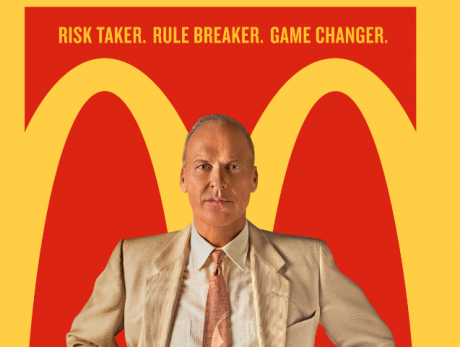Arts
You are here
McCapitalism

March 15, 2017
One of the great ironies of director John Lee Hancock’s The Founder, about the founding of McDonald’s restaurant, is the portrayal of brothers Dick and Mac McDonald as guardians of integrity resisting the crass commercialism symbolized by businessman Ray Kroc, played masterfully by Michael Keaton.
The Founder, which opened earlier last month, tells the story of how Kroc went from a likeable loser hawking milkshake mixers to jukebox diners in small-town 1950s America to becoming the face of perhaps the most iconic American brand to date. But it’s also a metaphor for the American Dream (though the film isn’t quite sure whether that dream is myth or reality). One thing that’s certain, however, is that despite the deliberate dichotomy between the brothers McDonald and Kroc, the film endorses only a tepid condemnation of capitalist exploitation.
In his book Throwing Rocks At the Google Bus, a critique of the modern digital economy, Douglass Rushkoff contrasts the values of peer-to-peer artisanal economics with those of industrial economics; this contrast is embodied by the McDonald brothers and Kroc, respectively. For instance, Ray and Mac, played sympathetically by Nick Offerman and John Carrol Lynch, are honest and resourceful, treating the family business like a fragile egg to be handled with care. Kroc, on the other hand, has visions of monopoly and corporation dancing in his head, and pleads with the reluctant brothers to franchise their business.
When it comes to production, the McDonalds are content selling their fifteen-cent hamburgers at their flagship store in San Bernardino, California, where they can oversee the process and guarantee quality and quick service; Keaton’s Kroc, transfixed by the assembly line efficiency of the McDonald’s kitchen and obsessed with the potential profits of mass production, hastily opens stores in Detroit, Chicago, Minnesota, and soon all across the country, quality control be damned. Where the brothers aim toward pleasing their customers and putting a human face to their business, Kroc, bedazzled by a photograph in the brothers’ office of a McDonald’s restaurant with golden arches, dreams of the Golden Arches as the quintessential all-American brand icon. Soon Kroc is selling powdered milkshakes without the brothers’ consent, lying about his role in the company and comparing hearts to contracts (“They’re made to be broken.”). In a chilling scene where the relationship between the three has deteriorated past the point of reconciliation and the brothers threaten litigation, Kroc scoffs, “I’m national. You’re fucking local.”
And yet, as Kroc morphs from a likeable loser with a pocketful of payphone coins to a ruthless, backstabbing capitalist, The Founder both vilifies and deifies him. As he sticks thumbtacks on a map of America like a colonist searching for new land to exploit, it seems the perfect picture of imperialist expansion: fast-food manifest destiny. Keaton plays an arched-eyebrow villain who is celebrated for his visionary concept and system. The McDonald brothers come across as naïve simpletons who got hoodwinked—outhustled by a fast-talking huckster lacking a moral compass, but shrewd enough to understand that in America, wealth is built on the extraction of value.
Sound familiar?
Section:
Topics:









